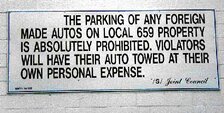
Here’s a quick quiz. Which one of the following is a foreign-made vehicle?
BMW Z3
Mazda 626
Mitsubishi Eclipse
Nissan Quest
Mercedes ML320
Cadillac Catera
The correct answer is the Cadillac Catera, which is built in Germany by General Motors. All the others are built in the United States. GM also produces nine of its other current car and truck models in Canada or Mexico. Ford produces three models in Canada, and DaimlerChrysler produces at least five models in just Mexico and Canada.
On the other hand, the U. S. is now home to nine foreign-owned auto companies (Honda, Isuzu, BMW, Mercedes, Mazda, Mitsubishi, Nissan, Subaru, and Toyota) that build three million cars per year in this country. The international auto makers will manufacture 26 different 1998 car models here, and eight of those models are built by workers who are members of the United Auto Workers union.
The transplants are not just assembling cars here with foreign parts. The domestic content of the vehicles built here by foreign car companies is now 69 percent, only slightly less than the 78 percent domestic content of cars built in the U. S.by the Big Three.
Joint ventures between the Big Three and international auto makers to build cars in the U. S. are now commonplace: GM and Toyota are partners, as are Ford and Mazda. Before its merger with Daimler-Benz, Chrysler teamed up with Mitsubishi. A dozen domestic and international manufacturers now build 12 millions cars annually in the U. S., indicating that we are becoming the strategic manufacturing center for a global automotive industry.
In this global car market, it is getting harder and harder to tell the difference between an "American car" and a "foreign car." Is a Cadillac Catera built in Germany foreign or American? What about the Toyota Corolla built in California by UAW workers? What about the vehicles that will now be produced by DaimlerChrysler? What about Jaguars built in England as a division of Ford Motor Company?
If myths die hard, nowhere do economic myths about international trade die harder than in Flint, Michigan. Despite the increasing senselessness of trying to accurately define a "foreign car" in today’s global economy, several organizations in Flint have policies that accommodate "American cars" but strictly prohibit "foreign cars."
For instance, the UAW Local 659 in Flint has the following sign in the parking lot: The parking of any foreign made autos on Local 659 property is absolutely prohibited. Violators will have their auto towed at their own personal expense. Woodrow Stanley, when elected mayor of Flint in 1991, announced a similar policy for the underground parking ramp below Flint City Hall.
Would the UAW or the city of Flint actually tow or ban Cadillac Cateras from their lots because they are "foreign cars" from Germany, or Buick Regals because they are built in Canada, or GMC Suburban C1500s because they are built in Mexico?
It is hard to imagine that the UAW would really tow one of the 26 models built by U. S. workers for international auto makers, especially UAW-built vehicles like the Isuzu Hombre truck, Mazda 626, Mazda B-series truck, Mitsubishi Eclipse, Mitsubishi Galant, Nissan Quest, Toyota Corolla, and the Toyota Tacoma truck. If you can not precisely define what a "foreign car" is any more, how can you ban them or tow them away?
Our high standard of living in Michigan is a direct result of trade—trade with other states and trade with other countries. Michiganians should shop for the lowest price and highest quality and we should buy the products that give us the highest value, regardless of whether the products were produced across the street or across the world. That’s what a global economy is all about—having access to the best and cheapest goods from wherever they are made.
Parking lot restrictions against foreign vehicles should be seen for what they really are: modern, automotive Jim Crow laws that discriminate against certain Americans based on the national origin of their vehicle. Although these restrictions may have made sense to some people in the past, they have no place in a global economy where trying to even define a "foreign car" can drive you crazy.

The Mackinac Center for Public Policy is a nonprofit research and educational institute that advances the principles of free markets and limited government. Through our research and education programs, we challenge government overreach and advocate for a free-market approach to public policy that frees people to realize their potential and dreams.
Please consider contributing to our work to advance a freer and more prosperous state.